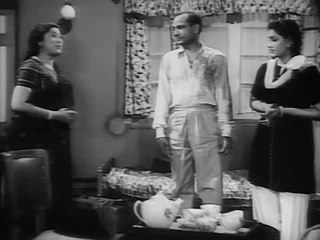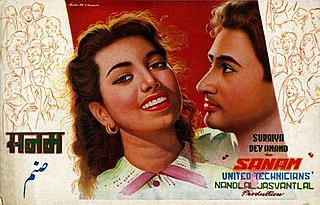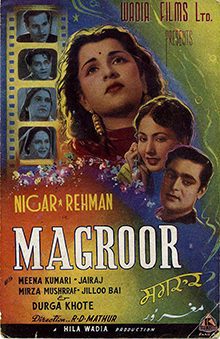
Meena Kumari was an Indian actress and poet, who worked in Hindi films. Popularly known as The Tragedy Queen, she is regarded among the finest and greatest actresses in the history of Indian cinema. In a career spanning 33 years, from child actress to adult, Kumari starred in over 90 films.

Baiju Bawra is a 1952 Hindi musical romantic drama film directed by Vijay Bhatt. Produced by Prakash Pictures, with story by Ramchandra Thakur and dialogues by Zia Sarhadi, Baiju Bawra was a musical "megahit" which had a mighty 100-week run in the theatres. Bhatt's decision to make a film based on classical music was met with scepticism by the Indian film industry due to its "lack of mass appeal", but the film and music turned out be an "overwhelming success".
Meena Kapoor was an Indian playback singer. She was the daughter of actor Bikram Kapoor who worked with the New Theatres studio. Her family was also related to famed filmmaker PC Barua. Meena's singing was noticed at a young age by composers like Ninu Mazumdar and SD Burman. She was a playback singer in Hindi cinema, during the 1940s and 1950s, singing hits such as "Rasiya Re Man Basiya Re" from Pardesi (1957), Ek Dharti Hai Ek Gagan from Adhikar (1954) and 'Kachhi hai Umariya' picturised on Meena Kumari in Char Dil Char Rahen (1959). She was a friend of the singer Geeta Dutt; the two had similar vocal styles.

Bawre Nain is a 1950 Indian Hindi-language romance film directed by Kidar Nath Sharma. It was produced under the Ambitious Pictures banner at Shree Sound Studios. For the music, Sharma persisted with music director Roshan, in spite of several demands from film distributors to have him removed following his failure as a composer in an earlier film, Neki Aur Badi (1949). The music became popular and is stated to be the reason for the film's success. One of the noteworthy songs that popularised playback singer Mukesh was "Teri Duniya Mein Dil Lagta Nahin", composed in Raga Darbari Kaanada. Bawre Nain is cited as Roshan's "first big hit" as a music composer.

Ghulam Mustafa Durrani was an Indian radio drama artist, playback singer, actor and music director.
The Muslim social is a film genre in Bollywood that portrays Islamic culture in India. It flourished in the 1950s and 1960s and lasted till the early 1980s. Muslim socials are divided into two categories: "classic Muslim socials" that explore nawabi culture and focus on upper class or elite Muslim families, and "new wave Muslim socials" that portray middle class Muslim families who experience economic problems, discrimination and communal violence. Muslim socials often include ghazals, qawwalis, Urdu poetry and expressions, and musical forms commonly associated with Islamic culture. However, lately the label has also been criticized for cultural ghettoization of minority cinema. Director M.S. Sathyu who made Garam Hava (1973), called it "a skewed way to look at cinema. When there is no Hindu social or Christian social, how can there be a Muslim social".

Ek Thi Larki is a 1949 Hindi action comedy film by director Roop K. Shorey. It had the famous Punjabi song "Laara Lappa Laara Lappa Layi Rakhda" by Lata Mangeshkar, Satish Batra and Mohammad Rafi. The music director was Vinod, with lyrics by Aziz Kashmiri and story by I. S. Johar. The film starred Meena Shorey who became famously known as the "Larra Lappa" girl following the release of the film, and Motilal. Other co-stars were Bharat Bhushan, I. S. Johar, Agha, Shakuntala, and Kuldip Kaur.

Meena Khadikar is an Indian Marathi and Hindi playback singer and composer. She is the second eldest daughter of Pt. Deenanath Mangeshkar and sister of veteran singers Lata Mangeshkar, Asha Bhosle, Usha Mangeshkar and Hridaynath Mangeshkar.
Himmat is a 1941 Bollywood Hindi film. It starred Manorama, Radha and Ragni. The film features the first-ever version of the popular song "Inhi Logon Ne", sung by Shamshad Begum. This song was then used in the 1943 film Aabroo and was sung by yesteryear comic actor Yakub. "Inhi Logon Ne" gained popularity and recognition from the 1972 film, Pakeezah, in which it was sung by Lata Mangeshkar, and picturised on Meena Kumari.

Bachchon Ka Khel is a 1946 Indian film produced by Ramnik Productions and directed by Raja Nene. It was released at Novelty Bombay on 2 May. The film's music is by C. Ramchandara, lyrics by Magan, Pt Sharma and art direction by Shripatrao Mane. The film starred Meena Kumari, Aga Jan, Nimbalkar, Shanta Patel and Baby Shakuntala.
Harnam Singh Rawail, often credited as H. S. Rawail, was an Indian filmmaker. He debuted as a director with the 1940 Bollywood film Dorangia Daku and is best known for romantic films like Mere Mehboob (1963), Sunghursh (1968), Mehboob Ki Mehndi (1971) and Laila Majnu (1976). His son Rahul Rawail and grandson Rajat Rawail are film directors too; the former paid a tribute to his father's film Sunghursh by titling one of his film as Jeevan Ek Sanghursh (1990).

Aladdin And The Wonderful Lamp is a 1952 Indian fantasy film produced and directed by Homi Wadia.

Chandni Chowk is a 1954 classic Muslim social drama film directed by B. R. Chopra.
Asad Bhopali was an Indian Hindustani poet and lyricist. The Encyclopaedia of Hindi Cinema, compiled by Gulzar and Saibal Chatterjee, describes him as one of the "few names that stand out for their contribution to Hindi film lyrics".

Meena Shorey was a Pakistani film actress who worked first in Indian cinema and later Pakistani cinema. She appeared in Hindi/Urdu and Punjabi films. Credited in films by her mononym, Meena, her real name was Khurshid Jehan. She started her acting career playing a character role, as Ambhi, Raja of Taxila's sister in Sohrab Modi's Sikandar (1941). Married to her third husband, Roop K. Shorey, by the mid-1940s, she found fame when she acted in her husband's film Ek Thi Larki (1949), opposite actor Motilal. The story was written by I. S. Johar, who also starred in the film. The "foot-tapping" music composed by Vinod became a "huge hit", with Meena becoming an "icon" for the "new liberated" young women. Meena was acclaimed as the "Lara Lappa Girl", from the song of same title in the film. She was one of the first women to be recognised in Indian cinema as a "comedienne of calibre". She was also popularly known as The Droll Queen of Partition as she worked in both in India and Pakistan.

Sanam is a 1951 Bollywood romantic film directed by Nandlal Jaswantlal, who also directed the classic Anarkali. It starred Dev Anand, and his co-star was Suraiya, who also recorded the playback singing for the film. Meena Kumari acted in the film in a supporting role, where she played the role of Suraiya's best friend. The film was an average at the box office, which attributed to Suraiya's fading stardom in the early 1950s, and Madhubala's and Nargis' simultaneous rise as the top female stars.

Magroor (transl. Proud) is a 1950 Indian Hindi-language romance film produced by J.B.H. Wadia and directed by cinematographer R.D. Mathur.

Daana Paani is a 1953 Indian Hindi-language film starring Meena Kumari and Bharat Bhushan in lead roles. The music was composed by Mohan Junior. After the success of Baiju Bawra released in 1952, Bhushan and Kumari were paired again in this film. A 15 year old Shashi Kapoor appeared as a child artist with the name Master Shashiraj in the film.

Pakeezah is a 1972 film directed by Kamal Amrohi. The film is remembered as one of the most elaborate musicals of Indian Cinema.














